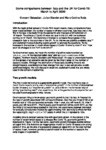Some comparisons between Italy and the UK for Covid-19: March to April 2020
| dc.contributor.author | Sebastiani, G | |
| dc.contributor.author | Stander, Julian | |
| dc.contributor.author | Cortina Borja, M | |
| dc.date.accessioned | 2021-11-09T15:26:21Z | |
| dc.date.issued | 2020-04-21 | |
| dc.identifier.issn | 1740-9705 | |
| dc.identifier.uri | http://hdl.handle.net/10026.1/18281 | |
| dc.description.abstract |
With the rapid global spread of Covid-19 in recent weeks, many comparisons have been made between the number of cases in different countries. Italy was one of the first in Europe to be badly hit by the pandemic and imposed a full lockdown on 12 March. The effects of Covid-19 were felt later in the UK, with the lockdown coming on 24 March. It is therefore of interest to compare the progress of the disease in Italy to the countries of the UK. To do this we use publicly available data1,2 and statistical models including logistic growth to address the questions, “Is the increase in the number of documented cases of Covid-19 slowing down?” and “How soon do changes follow from lockdowns?”. By documented cases, we mean the number of positive tests recorded as totale_casi in the regional Italian data1 and as ConfirmedCases in the England, Northern Ireland, Scotland and Wales data2 . An easy to understand handle on the spread of an epidemic can be given by the time it takes for the number of cases to double. Although the estimation of these daily doubling times is not straightforward, examining how they change from day to day can provide us with additional insights. We now discuss in detail two statistical models that are widely used in the context of epidemics. | |
| dc.language.iso | en | |
| dc.publisher | Royal Statistical Society | |
| dc.title | Some comparisons between Italy and the UK for Covid-19: March to April 2020 | |
| dc.type | journal-article | |
| plymouth.publisher-url | https://www.significancemagazine.com/science/657-some-comparisons-between-italy-and-the-uk-for-covid-19-march-to-april-2020?highlight=WyJzdGFuZGVyIl0= | |
| plymouth.journal | Significance: statistics making sense | |
| plymouth.organisational-group | /Plymouth | |
| plymouth.organisational-group | /Plymouth/Admin Group - REF | |
| plymouth.organisational-group | /Plymouth/Admin Group - REF/REF Admin Group - FoSE | |
| plymouth.organisational-group | /Plymouth/Faculty of Science and Engineering | |
| plymouth.organisational-group | /Plymouth/REF 2021 Researchers by UoA | |
| plymouth.organisational-group | /Plymouth/REF 2021 Researchers by UoA/EXTENDED UoA 10 - Mathematical Sciences | |
| plymouth.organisational-group | /Plymouth/REF 2021 Researchers by UoA/UoA10 Mathematical Sciences | |
| plymouth.organisational-group | /Plymouth/Users by role | |
| plymouth.organisational-group | /Plymouth/Users by role/Academics | |
| dcterms.dateAccepted | 2020-04-20 | |
| dc.rights.embargodate | 2021-11-13 | |
| dc.rights.embargoperiod | Not known | |
| rioxxterms.licenseref.uri | http://www.rioxx.net/licenses/all-rights-reserved | |
| rioxxterms.licenseref.startdate | 2020-04-21 | |
| rioxxterms.type | Journal Article/Review |


